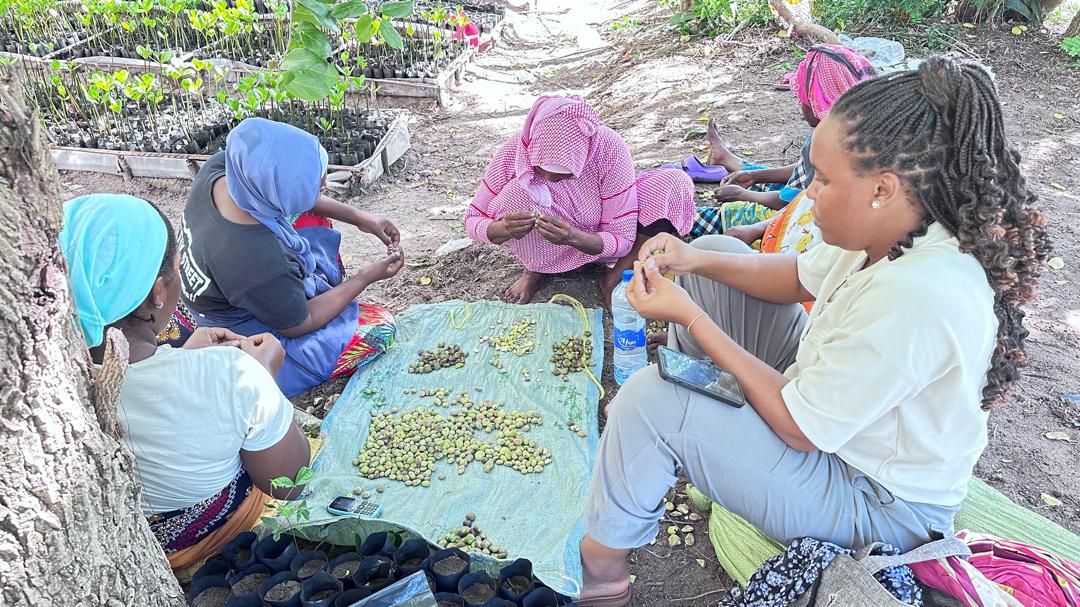
Published: APRIL 18, 2025
Climate Action Network Tanzania (CAN Tanzania) is making strides in environmental conservation and climate resilience through its ongoing project, aiming at strengthening biodiversity conservation and enhancing the adaptive capacity of coastal communities in Pangani District.
With continued support from the Global Environment Facility Small Grants Programme (GEF/SGP) and the United Nations Development Programme (UNDP), CAN Tanzania has successfully established a mangrove nursery and beekeeping initiatives in Ushongo Village, Pangani District. The project is being implemented in collaboration with the Beach Management Unit (BMU), which is taking a leading role in managing the initiatives.
The mangrove nursery and beekeeping activities are designed to restore and protect vital coastal ecosystems while providing sustainable livelihoods for local residents through honey production. These nature-based solutions foster environmental stewardship and help communities adapt to climate change impacts by promoting sustainable resource use and reducing harmful practices such as charcoal production.
The nursery currently hosts over 7,900 seedlings of four key native mangrove species—Avicennia marina (Mchu), Ceriops tagal (Mkandaa), Xylocarpus granatum (Mkomafi), and Bruguiera gymnorrhiza (Msinzi)—each contributing significantly to coastal ecosystem restoration and resilience. The beekeeping initiative complements this by offering an alternative income source that supports both conservation and community economic stability.
CAN Tanzania emphasizes the critical role of community involvement and locally-led governance in the long-term success of these climate resilience initiatives. Through training, participatory management and collaboration with local stakeholders, the project strengthens the capacity of coastal communities to sustainably manage their natural resources and adapt to environmental challenges.
Join us in supporting community-led climate action, whether through volunteering, spreading awareness, or partnering with CAN Tanzania, your involvement can help strengthen coastal resilience and protect vital ecosystems for a sustainable future of Tanzania’s coastal communities.
With continued support from the Global Environment Facility Small Grants Programme (GEF/SGP) and the United Nations Development Programme (UNDP), CAN Tanzania has successfully established a mangrove nursery and beekeeping initiatives in Ushongo Village, Pangani District. The project is being implemented in collaboration with the Beach Management Unit (BMU), which is taking a leading role in managing the initiatives.
The mangrove nursery and beekeeping activities are designed to restore and protect vital coastal ecosystems while providing sustainable livelihoods for local residents through honey production. These nature-based solutions foster environmental stewardship and help communities adapt to climate change impacts by promoting sustainable resource use and reducing harmful practices such as charcoal production.
The nursery currently hosts over 7,900 seedlings of four key native mangrove species—Avicennia marina (Mchu), Ceriops tagal (Mkandaa), Xylocarpus granatum (Mkomafi), and Bruguiera gymnorrhiza (Msinzi)—each contributing significantly to coastal ecosystem restoration and resilience. The beekeeping initiative complements this by offering an alternative income source that supports both conservation and community economic stability.
CAN Tanzania emphasizes the critical role of community involvement and locally-led governance in the long-term success of these climate resilience initiatives. Through training, participatory management and collaboration with local stakeholders, the project strengthens the capacity of coastal communities to sustainably manage their natural resources and adapt to environmental challenges.
Join us in supporting community-led climate action, whether through volunteering, spreading awareness, or partnering with CAN Tanzania, your involvement can help strengthen coastal resilience and protect vital ecosystems for a sustainable future of Tanzania’s coastal communities.
